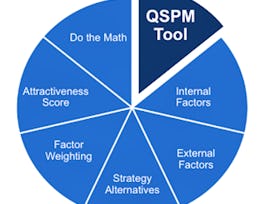Most professions these days require more than general intelligence. They require in addition the ability to collect, analyze and think about data. Personal life is enriched when these same skills are applied to problems in everyday life involving judgment and choice. This course presents basic concepts from statistics, probability, scientific methodology, cognitive psychology and cost-benefit theory and shows how they can be applied to everything from picking one product over another to critiquing media accounts of scientific research. Concepts are defined briefly and breezily and then applied to many examples drawn from business, the media and everyday life.


Mindware: Critical Thinking for the Information Age
Taught in English
Some content may not be translated
74,533 already enrolled
(1,351 reviews)
What you'll learn
Apply decision-making methods from this course to your own life.
Identify key terms that relate to causes of cognitive bias.
Better assess probability based on contextual factors.
Skills you'll gain
Details to know

Add to your LinkedIn profile
15 quizzes
See how employees at top companies are mastering in-demand skills


Earn a career certificate
Add this credential to your LinkedIn profile, resume, or CV
Share it on social media and in your performance review

There are 10 modules in this course
Individuals and cultures can make themselves smarter. Since the beginning of the Industrial Revolution, people have become enormously smarter. The Information Age requires a brand-new set of skills involving statistics, probability, cost-benefit analysis, principles of cognitive psychology, logic and dialectical reasoning.
What's included
1 video3 readings
Basic concepts of statistics and probability including the concepts of variable, normal distribution, standard deviation, correlation, reliability, validity, and effect size. Concrete examples are drawn from everyday life and show how the concepts can be used to solve ordinary problems.
What's included
2 videos2 readings1 quiz1 discussion prompt
How to think about events in such a way that they can be counted and a decision can be made about how much data is enough. You will learn about the concept of error variance and how it can be combatted by obtaining multiple observations. Your will learn that your judgments about people’s personalities are prone to serious errors that are largely avoided for judgments about abilities. And you will discover why it’s usually a mistake to interview job applicants.
What's included
2 videos2 readings4 quizzes1 discussion prompt
It can be extremely difficult to make an accurate assessment of how two variables are related to one another; prior beliefs can be more important than data in estimating the strength of a given relationship. You will learn simple tools to estimate degree of association. You will learn about the nature of illusory correlations and how to avoid them. You will learn about the concepts of confounded variable and self-selection error.
What's included
4 videos3 readings2 quizzes
You will learn that correlations can only rarely provide conclusive evidence about whether one variable exerts a causal influence on another and why experiments provide far better evidence about causality than correlations. You will be shown how to conduct experiments in business settings and experiments on yourself. You will learn the distinction between within subject designs and between subject designs. You will learn about the concept of artifacts and some tricks for avoiding them. You will learn how to discover natural experiments.
What's included
3 videos2 readings1 quiz2 discussion prompts
You will learn about the kinds of systematic errors we make when trying to predict the future. You will learn about regression to the mean and why you should assume that extreme values on a variable will be less extreme when next observed. You will learn how to think about observations in terms of true score plus error. You will learn about the concept of base rate and why it must be taken into account when estimating probabilities of specific events.
What's included
2 videos2 readings1 quiz1 discussion prompt
We understand the world not through direct perception but through inferential procedures that we are unaware of. Our understanding of the world is heavily influenced by schemas or abstract representations of events. We are prone to serious judgment errors that can be avoided to a degree when we understand their basis. We make guesses about probability and causality by applying the representativeness heuristic based on similarity assessments which can be very misleading. We make judgments about frequency and probability by relying in part on the availability heuristic, judging things as frequent or probable to the degree that instances come readily to mind.
What's included
3 videos1 reading2 quizzes1 discussion prompt
How to conduct a cost-benefit analysis. Why you should throw the analysis away after doing it if the decision is personal and very important. How to avoid throwing good money after bad. How to avoid doing something that will prevent you from doing something more valuable. Why it can be expensive to try to avoid the possibility of loss. Why incentives can backfire.
What's included
3 videos1 reading2 quizzes1 discussion prompt
The distinction between inductive logic and deductive logic. Syllogisms. Conditional reasoning. The distinction between truth of an argument and validity of an argument. The concepts of necessity and sufficiency. Venn diagrams. Common logical errors. When to avoid contradiction and when to embrace it, how to avoid undue certainty about judgments and decisions, and why attention to context rather than form is crucial for analysis of most real-world problems.
What's included
2 videos1 reading2 quizzes1 discussion prompt
What's included
1 video3 readings
Instructor

Offered by
Recommended if you're interested in Psychology

Michigan State University

Johns Hopkins University

Coursera Project Network

University of Maryland, College Park
Why people choose Coursera for their career




Learner reviews
Showing 3 of 1351
1,351 reviews
- 5 stars
82.08%
- 4 stars
15.54%
- 3 stars
1.85%
- 2 stars
0.22%
- 1 star
0.29%
New to Psychology? Start here.

Open new doors with Coursera Plus
Unlimited access to 7,000+ world-class courses, hands-on projects, and job-ready certificate programs - all included in your subscription
Advance your career with an online degree
Earn a degree from world-class universities - 100% online
Join over 3,400 global companies that choose Coursera for Business
Upskill your employees to excel in the digital economy
Frequently asked questions
Access to lectures and assignments depends on your type of enrollment. If you take a course in audit mode, you will be able to see most course materials for free. To access graded assignments and to earn a Certificate, you will need to purchase the Certificate experience, during or after your audit. If you don't see the audit option:
The course may not offer an audit option. You can try a Free Trial instead, or apply for Financial Aid.
The course may offer 'Full Course, No Certificate' instead. This option lets you see all course materials, submit required assessments, and get a final grade. This also means that you will not be able to purchase a Certificate experience.
When you purchase a Certificate you get access to all course materials, including graded assignments. Upon completing the course, your electronic Certificate will be added to your Accomplishments page - from there, you can print your Certificate or add it to your LinkedIn profile. If you only want to read and view the course content, you can audit the course for free.
You will be eligible for a full refund until two weeks after your payment date, or (for courses that have just launched) until two weeks after the first session of the course begins, whichever is later. You cannot receive a refund once you’ve earned a Course Certificate, even if you complete the course within the two-week refund period. See our full refund policy.


